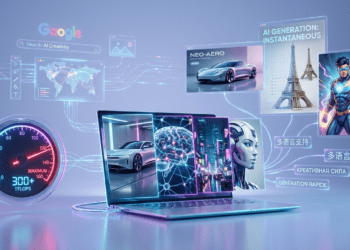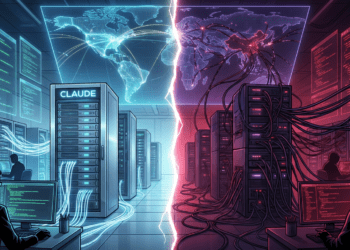Mark Cuban has never been one to mince words. The billionaire entrepreneur and former Shark Tank star recently made a prediction that’s sending ripples through the tech world. Speaking on the High Performance podcast, Cuban declared that artificial intelligence will create the world’s first trillionaire and it might not be who you’d expect.
“We haven’t seen the best, or the craziest, of what [AI] is going to be able to do,” Cuban told listeners. “Not only do I think it’ll create a trillionaire, but it could be just one dude in the basement. That’s how crazy it could be.”
The Garage Revolution 2.0

Cuban’s prediction isn’t just wishful thinking. History backs him up. Some of today’s biggest tech giants started in the most humble places. Steve Jobs founded Apple in his parents’ garage. Jeff Bezos launched Amazon from his garage too. Even OpenAI, now valued at$300 billion, began in cofounder Greg Brockman’s living room back in 2015.
The pattern is clear. Revolutionary breakthroughs often come from unexpected places. Cuban believes AI will follow this same trajectory, but with even more dramatic results.
“There’s always something bigger and better that’s created by an innovative entrepreneur,” Cuban explained. “But AI just dwarfs all that.”
The 66-year-old investor sees AI as fundamentally different from previous technological revolutions. While the internet and smartphones transformed how we communicate and access information, AI has the potential to augment human intelligence itself.
We’re Still in the Preseason
According to Cuban, we’re barely scratching the surface of AI’s capabilities. He compares our current moment to the “preseason” of what’s possible. Today’s applications scheduling assistants, chatbots, and productivity tools are just the beginning.
“Remember the early days of PCs and people were like, ‘I don’t need that… What’s this internet thing? Why do we need it?’ Then it was smartphones,” Cuban said. “We’ll find something equivalent for AI and then, five years [later]… people will be like, ‘How did I live without it?'”
The billionaire practices what he preaches. Cuban uses AI extensively in his daily life, from tracking his health metrics for atrial fibrillation to creating content for work. He’s particularly impressed with AI’s ability to identify patterns and potential concerns he might miss.
“I had to track when I was taking medications and working out, and used ChatGPT to help me record it,” Cuban shared. “And damn if it doesn’t do it. Now you’ve got to be careful… but being able to do the process and just having things identified that I might not have known to look for was insane.”
The Corporate AI Rush
Major companies are already seeing dramatic results from AI implementation. Chipotle CEO Scott Boatwright recently revealed that AI tools have cut his company’s hiring time by 75%. This kind of efficiency gain is becoming commonplace across industries.
But Cuban believes these corporate applications are just the obvious first steps. The real breakthrough will come from someone who sees AI’s potential in a completely different way.
“Most people condemn things when they first happen,” Cuban noted. “But then, when you see people using it and you realize the value, that’s when people come around.”
The Basement Advantage
Why does Cuban think the breakthrough will come from “just one dude in the basement” rather than a well-funded Silicon Valley startup? The answer lies in perspective and constraints.
When you’re working alone with limited resources, you’re not bound by corporate bureaucracy, investor expectations, or the need to show incremental progress every quarter. This freedom often breeds the kind of creative problem-solving that well-funded teams miss.
The barriers to AI experimentation have never been lower. You don’t need a PhD in machine learning or access to Google’s compute clusters to start working with state-of-the-art models. Tools like ChatGPT and Google’s Gemini are freely available to anyone with an internet connection.
“Download Gemini from Google. Download ChatGPT… and just ask your questions about anything,” Cuban advises. “But don’t assume the answers are right. And when you find something you don’t agree with, tell the AI you don’t agree with it.”
The Reality Check

Cuban isn’t blind to AI’s limitations and risks. He’s quick to point out that current AI systems aren’t actually thinking or truly intelligent.
“You have to realize that it’s not actually thinking… It’s not actually smart,” he emphasized. “But what it can do is find information and package it in a way that people can understand.”
The technology also comes with significant challenges. Job displacement is already happening companies like Duolingo are gradually replacing contractors with AI for tasks that can be automated. There are also concerns about AI-driven scams, misinformation, and cyber attacks.
The environmental impact is staggering too. Training a model like OpenAI’s GPT-3 requires 1,287 megawatt hours of electricity enough to power about 120 homes for an entire year.
Not the Terminator
Despite his bullish outlook on AI’s wealth-creating potential, Cuban is careful to temper expectations about artificial general intelligence.
“I’m not saying we’re going to get the Terminator,” he clarified. “I’m not saying that all of a sudden, there are going to be robots that are smarter than people… But we’ll find ways to make our lives better, more interesting, to work better, more effectively.”
This measured approach sets Cuban apart from some AI evangelists who promise imminent artificial general intelligence. Instead, he focuses on practical applications that enhance human capabilities rather than replace them entirely.
The Job Question
One of the most pressing concerns about AI is its impact on employment. Cuban addresses this head-on, offering a more nuanced view than many tech leaders.
“I’m not here to tell you that it’s going to replace everybody’s job. It won’t,” he predicted. “But the things that you like to do, if you’re creative, innovative, whatever it may be or you’re just bored it might end up being the best alternative to boredom.”
This perspective contrasts sharply with warnings from other tech executives. Amazon CEO Andy Jassy, Ford CEO Jim Farley, and Anthropic boss Dario Amodei have all suggested that AI will eliminate millions of jobs.
The Experimentation Imperative
Cuban’s advice to AI skeptics is blunt: “You have no say in the matter.” He believes the technology’s adoption is inevitable, regardless of individual resistance.
The key, according to Cuban, is to start experimenting now. He encourages people to engage with AI tools not just as users, but as active participants in improving the technology.
“When you find something you don’t agree with, tell the AI you don’t agree with it,” he suggests. This feedback loop helps address biases and improve performance over time.
The Trillion-Dollar Question
So who will become the world’s first trillionaire through AI? Cuban’s prediction points to someone we haven’t heard of yet an individual who will discover an application that makes AI indispensable to everyone.
The breakthrough might not come from making existing processes more efficient. Instead, it could enable entirely new categories of human activity or augment our capabilities in ways we can’t currently imagine.
Current wealth-tracking services suggest that Tesla CEO Elon Musk is on pace to become a trillionaire by 2027, partly due to his AI startup xAI, which has an estimated$80 billion valuation. But Cuban’s prediction suggests the real winner might be someone working on a problem that seems too niche or too weird for enterprise solutions.
The Race Begins

Cuban’s prediction comes at a unique moment in AI development. The tools are democratized, but the killer applications haven’t been discovered yet. We’re in a window where individual innovators can compete with well-funded corporations on relatively equal footing.
The question isn’t whether you can access powerful AI it’s whether you can see the problem that nobody else is looking at. The trillionaire breakthrough might be hiding in plain sight, waiting for someone to recognize it.
As Cuban puts it, we’re still in AI’s “preseason.” The real game is just beginning, and the starting line might be closer than we think. Whether that breakthrough comes from a basement, a garage, or a coffee shop remains to be seen. But if history is any guide, it probably won’t come from where we expect.
The race to find AI’s next paradigm shift is on. And according to Mark Cuban, the winner might just be “one dude in the basement” with a fast internet connection and a revolutionary idea.
Sources
- Fortune – AI can make anyone rich: Mark Cuban says it could turn ‘just one dude in a basement’ into a trillionaire
- Benzinga – Mark Cuban Predicts AI Will Create The First Trillionaire And ‘It Could Just Be One Dude In The Basement’
- CNBC – Mark Cuban: The world’s first trillionaire could be ‘just one dude in the basement’ who’s great at using AI
- TechSpot – Mark Cuban says AI could create the first trillionaire – “just one dude in the basement”
- Medium – The Basement Trillionaire: Why Mark Cuban’s AI Prediction Hits Different
- Men’s Journal – Mark Cuban Reveals if Robots Will Take Over the World









